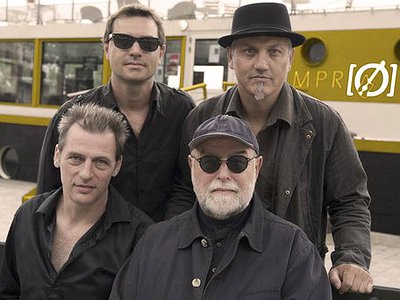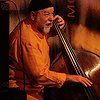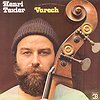Derek Bailey defined improvising as the search for material which is endlessly transformable. Regardless of whether or not you agree with his perspective, what kind of materials have turned to be particularly transformable and stimulating for you?
I agree with Derek Bailey with whom I was lucky enough to play. He was a great musician. Any kind of material is transformable and stimulating for me: a beautiful slow round and deep sounds on the bass … a "walkin’ bass" that is as beautiful and perfect as possible, but which also encompasses noisy sounds created by a "gestural attitude" without any thinking, something akin to "automatic writing" or "action painting" … It's all about seeing what can come out of that action … I need both the "figurative" and the "non-figurative" ...
Purportedly, John Stevens of the Spontaneous Music Ensemble had two basic rules to playing in his ensemble: (1) If you can't hear another musician, you're playing too loud, and (2) if the music you're producing doesn't regularly relate to what you're hearing others create, why be in the group. What's your perspective on this statement and how, more generally, does playing in a group compare to a solo situation?
I absolutely agree with John Stevens, but sometimes it can be interesting to not only listen as a follower to the others musicians but also "provoke" them and be stimulating in a particular situation. Speaking very simply, playing together is 50% listening as closely as possible to your companions and 50% concentrating on your own playing in order to be able to anticipate as quickly as possible what can happen in the band. The solo situation is very difficult, totally personal, you must find your own energy and inspiration. You are in a very fragile situation, especially if the audience is not on the same vibe as you are. If so, then you have to be very modest and let the music itself establish the connection with the listeners, instead of trying to catch them.
Some people see recording improvised music as a problem. Do you?
What problem? For me, there is no problem at all concerning any recording of any kind of music.
In the 20th century, the relationship between music and other forms of art – painting, video art and cinema most importantly - has become increasingly important. How do you see this relationship yourself and in how far, do you feel, does music relate to other senses than hearing alone?
Since my very beginnings, I was involved in relationship with other art forms. I was lucky enough to meet a lot of different creators of almost every kind of expression.
Playing for a painting performance or for a play as a musical actor, composing and playing live for cinema, photography, ballets and a lot more… For a friend’s funeral … You have to really realise that music is not the most important element. Music, in all of these cases, is always behind the image, the speaking, the movement … If you think the music is as important as the story, you are going to be very frustrated! Music can only create a particular vibration and that vibe is going to touch a sensitive part of the listener that other elements cannot touch at that particular moment. This special moment can make you, in fact, more free in your creative process and some kind of different music can appear through those other art forms and inspire you … Something different than composing or improvising just for the music itself.
Some of my pieces I play on stage are inspired by soundtracks or music for theatre I was composing and it only became music on its own terms later … But imagining music in itself or music to be combined with an other art form are two different states in the creative process.
In how much, do you feel, are creative decisions shaped by cultural differences – and in how much, vice versa, is the perception of sound influenced by cultural differences?
Music, for me, is the perfect universal language and cultural differences make our inspiration and this inspiration is supposed to be without any limit. I claim the hybrid!





